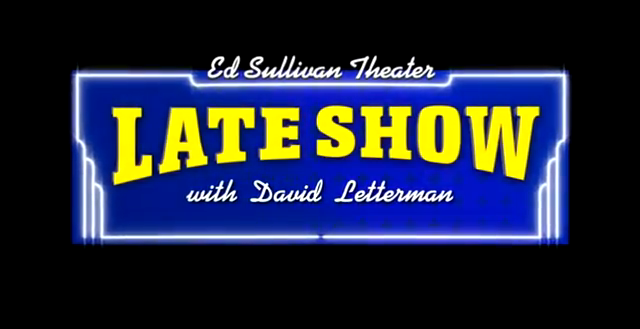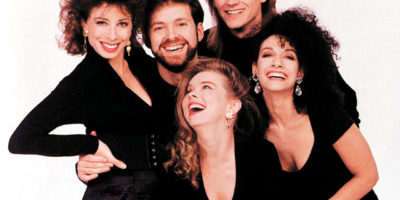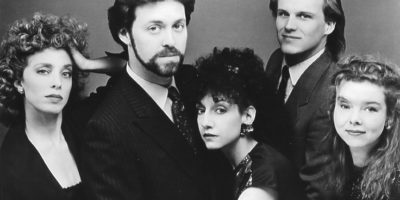As a freelancer and as a voiceover talent, one expects to be out of work more often then not. For every ten + auditions or so, you’re lucky to get one booking. For every 30 bookings or so, you’re lucky to land a “plum” gig. Either an account, a big spot that runs a lot, or a steady job. I have occasionally been lucky enough to hold a winning ticket. But maybe- if you’re very lucky- once in your career you get a gig that is a stand out. That keeps you employed more often than not, while allowing you to work with some of the most wonderful people in the business. And that allows you to have more fun than you thought possible, while getting paid.
The Late Show with David Letterman was one such gig. For 13 years I had the great pleasure most weeks of sitting on the couch and working alongside of some of the best voiceover guys in the business- Sam Freed, Ralph Gunderman, Robb Webb and JR Horne to name a few. We voiced the fake “announcements” and “commercials” during Dave’s monologues throughout the years (along with David Slavin, Monica Trombetta, Craig Wolman, Tom Bozell, Jeff Berman, Nicole Burley, Davide Callegati, Chris Phillips, Ramsey Faragallah, Matthew Piazzi, Jen Cohen, and many others).
We worked with some wonderful writers (Lee Ellenberg, Jeremy Weiner, Steve Young, Joe Grossman, RJ Fried, Matt Roberts, Matt Kirsch, Jill Goodwin, Paul Masella, Mike Leech, Zach Smilovitz, Alex Buley, Chris Belair, etc., who also happen to be great people.) I always felt very honored to be trusted with their scripts. They allowed me to play everything from an awards show announcer to an incredibly annoying voice on hold, to Joy Philbin ripping Regis a second one ;-).
Here’s how it would work: Dave’s writers would each write a script or two for the opening monologue that needed an announcer or a voice (I say an announcer OR a voice because every so often, we’d just have to show up to sneeze, curse or chew ;-)). Every day at around 11:00, I’d wait for a call from my agent’s office. If they called, that meant that one or two of the writers wanted me to voice his or her script, and that I’d have to get there by 11:45 (not tough, since it was only 20 blocks from my apartment). If they didn’t call, I was released for the day. Every week was different- depending on the writers needs. We might be asked to go in anywhere from one to four days on any given week. Thursdays were double taping days, and for those of us who booked scripts for the first taping, we’d usually go out for lunch and wait to see if we were on call for the second taping of the day. Once we recorded our scripts, Dave would listen to them and then decide which writer’s pieces would make it into the show. Sometimes your script would make the cut, sometimes not. But we were working under a very strong AFTRA agreement (The Net Code) and of course got paid whether or not it ran. After 13 years of this, it got to be a very comfortable routine. (And I never lost sight of how fortunate I was.)
Walking into the darkened control room was a delight. It was home to some great editors and great guys – Dan Baggio, Andrew Evangelista, and Mark Spada among others, that made the whole thing seem easy. And there were some wonderful people that worked behind the scenes- Thea Kalcevic and Tom Foster, two lovely people that began as interns and eventually became integral to our job and to the show (as well as becoming friends). It was also a joy for me to run into old friends who worked on The Late Show like Bill Scheft, Dave’s right hand man, who I met during my days at Catch a Rising Star. Our VO sessions were run beautifully on double taping days by Louise Galante and Clay Mudge-Parker. But the star of our show was our associate director and VO producer, Jessica Santini, who was our daily touchstone. It is rare that you have the opportunity to work with someone who is not only completely proficient at their job, but who also happens to be a true champion and advocate for actors. She was not only a Superwoman in the control room, but also someone I came to care for, respect, trust and admire. And although we never worked directly with Late Show’s director Jerry Foley, from time to time he’d stop by the control room to say hello in his easy and affable way. It was such a lovely group of people; A small village that made the show run like clockwork.
It’s interesting and rare having a job in this industry that lasts as long as 13 years. In some ways, it was both a blessing and a (very small) curse. (But let’s be honest… MOSTLY a blessing!) The advantage was having fairly reliable work on a weekly basis for such a long time that offered some financial security and that added to my union pension. The bonus was working with such incredibly talented and nice people. The curse was being on call Monday through Thursday and never quite knowing what my schedule would be for the day or for the week, and only being able to take time off when Dave took time off (I know- a luxury problem!) And as a freelancer (and not a contract player), not wanting to take any extra time off, lest someone else step in to take my place. In one such instance, I was in the hospital for knee surgery- I think I tried to plan it on a week when the show was dark. I had to stay in the hospital longer than expected and then somewhat forced myself to go back to work earlier than I should have. Frankly, I didn’t care. I dragged my ice pack and my Tylenol along with me. I loved the work.
When word went out that Dave was ending the show, it was of course met with some concern. So many of the writers and the crew had worked on the show much longer than I had- some for as long as Dave was at CBS. They were going to need to find new employment. And even though I knew the show was ending and that my time would be freed up, I knew that for the last week I could not put anything else on my plate. There was something sacred about saying goodbye to a job that had lasted so long and been so completely enjoyable. I felt that in its final days, I needed to allow the time and space- both literally and emotionally – for this experience to wind down in it’s own way.
Eventually, the show did end. The wardrobe department began to unload some of their stuff. (I made off with some very cool ties. ;-)) The day after the last taping, only veteran VO guy Robb Webb got called in (Robb also preceded all of us on this job), but we all showed up to say our goodbyes. The following days, many of the set pieces were deposited into the waiting dumpsters outside. It was heartbreaking. I always thought that they should be assigned to a museum; Perhaps the museum of Television and Radio, but the powers that be had other plans.
The week after the show ended, I think that all of us were ready for it on some level. But what started out as a bittersweet ending to a wonderful time then turned into more of a vacuum than I could have ever expected. I spent a good many days just trying to catch my breath. What had happened to my routine? Where was the camaraderie? The show was ending as the MP3 audition from home was firmly establishing itself, which meant that for the most part, voiceover actors seldom saw each other at auditions anymore. This job was one of the rare opportunities that allowed us all to be reminded of just how important that camaraderie was. It was like saying goodbye to your family.
I consider myself extremely lucky to have had such a wonderful run and such an incredible ride with such amazing people. Grateful only begins to describe it. For so many reasons, it was a joy to work on The Late Show – the incredible crew, the talented writers, and the wonderful VO talents I worked alongside of. I owe all of them a tremendous debt of gratitude.
And last but not least, I have to mention the man who made it possible for all of us to share in this incredible experience, and whom I still miss seeing every week night at 11:35. To my hometown boy from Indianapolis- Thank you, David Letterman.
https://performingartslegacy.org/krieger/mapping-the-legacy/entry/42/




